
Wishbone Ash are a British rock band who achieved success in the early to mid-1970s. Their albums include Wishbone Ash (1970), Pilgrimage (1971), Argus (1972), Wishbone Four (1973), There's the Rub (1974) and New England (1976).
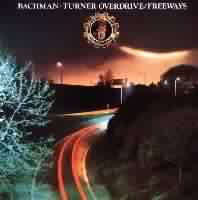
Freeways is the sixth studio album by Canadian rock band Bachman–Turner Overdrive, released in 1977. It was the last album that Randy Bachman would be a part of with BTO until seven years later when a "reunion" Bachman-Turner Overdrive studio album was made and released in 1984. This is also the last studio album to be made with the band's classic and most successful Not Fragile line up. It was the first BTO studio album to become a commercial failure, featuring the first BTO single that did not chart. Randy Bachman wrote every song besides "Life Still Goes On", while only two of the album's eight songs featured Fred Turner as the lead vocalist.

Cherry Pie is the second studio album by American glam metal band Warrant, released September 11, 1990. The album is the band's best-known and highest-selling release and peaked at number 7 on the Billboard 200. The album featured the top 40 hits "Cherry Pie" and "I Saw Red".
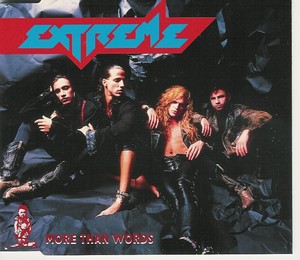
"More Than Words" is a song by American rock band Extreme. It is a ballad featuring acoustic guitar work by Nuno Bettencourt and the vocals of Gary Cherone. They both wrote the song, which was produced by Michael Wagener and represented a departure from the band's usual funk metal style. "More Than Words" was released as the third single from the band's second album, Pornograffitti (1990), on March 12, 1991 by A&M Records. It was a number one hit in the United States, where it was certified gold, as well as in Belgium, Canada, the Netherlands and New Zealand. The music video for the song was directed by Jonathan Dayton and Valerie Faris.

Wishbone Ash is the first studio album by Wishbone Ash. It peaked at number 29 in the UK Albums Chart in January 1971.
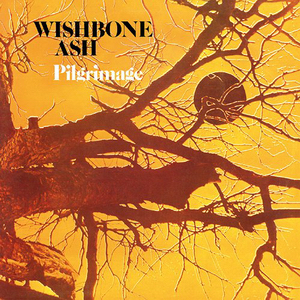
Pilgrimage is the second studio album by the rock band Wishbone Ash. The album focuses more on folk and acoustic music as opposed to the blues rock sound that dominated the first album. The album also contains the instrumental jazz workout "Vas Dis" as well as moodier, slower instrumentals such as "Alone" and "Lullaby".

Argus is the third album by the British rock band Wishbone Ash, released on 28 April 1972. It is their most commercially and critically successful album, peaking at No. 3 in the UK Albums Chart.

Live Dates is a live album by the British rock band Wishbone Ash released in November 1973.

There's the Rub is the fifth studio album by rock band Wishbone Ash. It is the first album to feature guitarist-vocalist Laurie Wisefield, who would be a major part of the band's creative direction for the next 11 years. It also marked a change in sound. It was the band's first album to be recorded in America and was produced by producer Bill Szymczyk. Although the trademark twin guitars were still evident, the album had a more "American" feel with a smoother production sound. Nevertheless, after the disappointing critical response to the previous studio album, Wishbone Four, reviews for There's The Rub were much more positive.
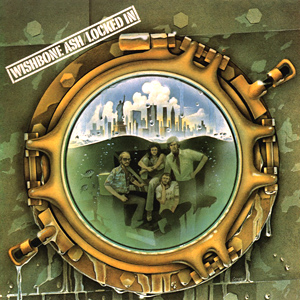
Locked In is the sixth studio album by the rock band Wishbone Ash, and their second with guitarist Laurie Wisefield who had joined the band in 1974. The album peaked at No. 36 in the UK Albums Chart in April 1976, their lowest UK chart placing to date. It was also the first Wishbone Ash album to feature original tracks not credited to the whole group with four of the tracks credited to either one or two members. The album is considered by many – critics, fans and the band themselves – to be one of the weaker entries in their extensive catalog. The band frequently place the blame on producer Tom Dowd, who insisted the band play much quieter in the studio, removing much of the energy of their performances. The band had switched U.S. distribution from MCA Records to Atlantic Records for this and the next release, New England.

New England is the seventh studio album by rock band Wishbone Ash released only seven months after Locked In. It was a success compared to Locked In but still did not chart as high as most of their previous albums. It peaked at No. 22 in the UK Albums Chart. This album marked the "Americanization" of Wishbone Ash, as the band relocated from England to the Northeastern United States for tax purposes.

Front Page News is the eighth album by rock band Wishbone Ash. It peaked at No. 31 in the UK Albums Chart.
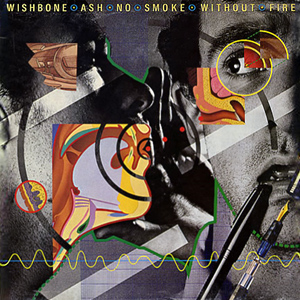
No Smoke Without Fire is the ninth studio album by English rock band Wishbone Ash. It was the first album since 1972's Argus to be produced by Derek Lawrence. The album peaked at No. 43 in the UK Albums Chart.
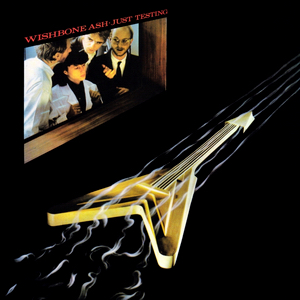
Just Testing is the tenth studio album by the British rock band Wishbone Ash, released on 18 January 1980 by MCA Records. Recorded primarily at Surrey Sound Studios in England, it was the last to feature the original lead vocalist and bass guitarist Martin Turner until the release of Nouveau Calls (1987). The track "Helpless" is only the second cover version released by the band on a studio album, the previous one being "Vas Dis" on Pilgrimage.

Live Dates 2 is the third live album by rock band Wishbone Ash. The album was recorded partly on dates between 1976 and 1980, including the tour in support of the album Just Testing. It peaked at No. 40 in the UK Albums Chart.

Number the Brave is the 11th studio album by rock band Wishbone Ash. It is the first album in the band's history recorded without founding bassist/vocalist Martin Turner. Turner was replaced by John Wetton, formerly of King Crimson and Uriah Heep. Also featured on Number the Brave was singer Claire Hamill as a backing vocalist, who would join Wishbone Ash on the 1981 tour to promote the album. Following "Vas Dis" on Pilgrimage and "Helpless" on Just Testing, the album featured only the third cover version released by the band on a studio album, Smokey Robinson's "Get Ready", previously a hit for The Temptations.

Twin Barrels Burning is the twelfth studio album by British rock band Wishbone Ash. It was recorded at Sol Studios and released in 1982. It was the highest charting Wishbone Ash album since 1976, reaching No. 22 in the UK Albums Chart. Conversely, it was the final album to appear in that listing to date.

"Day After Day" is a song by the British rock band Badfinger from their 1971 album Straight Up. It was written by Pete Ham and produced by George Harrison, who also plays slide guitar on the recording. The song was issued as a single and became Badfinger's biggest hit, charting at number 4 in the United States and number 10 in the UK, ultimately earning gold accreditation from the Recording Industry Association of America.
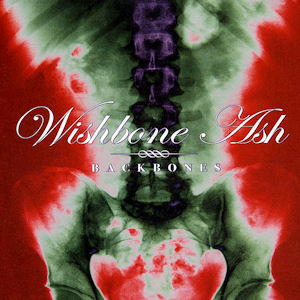
Backbones is a 2004 live compilation album released by Wishbone Ash. The album's third disc contains live and acoustic versions of previously unreleased material.
David Alan "Ted" Turner is an English guitarist and vocalist, best known for his work with the rock band Wishbone Ash, in which he was famed for his twin lead guitar instrumental arrangements with Andy Powell. Turner also contributed lap steel guitar to a variety of Wishbone Ash recordings.



















